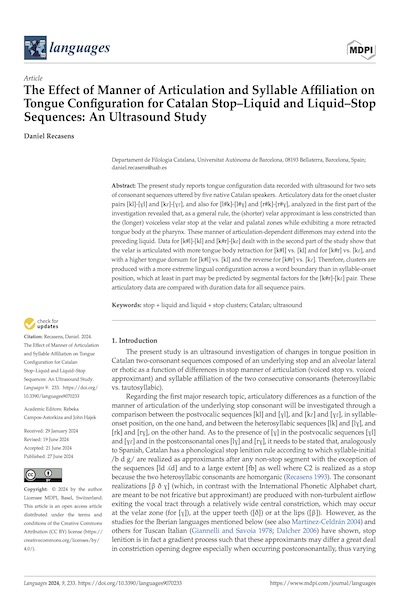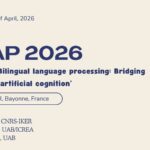5 abril, 2024
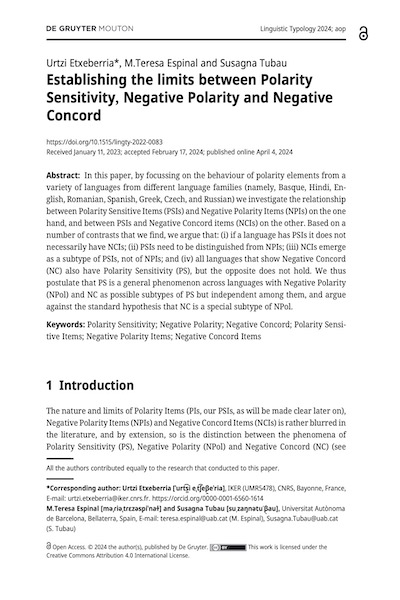
Autors:
Urtzi Etxeberria, M.Teresa Espinal & Susagna Tubau
Títol:
Establishing the limits between Polarity Sensitivity, Negative Polarity and Negative ConcordEditorial: Linguistic Typology (de Gruyter)
Data de publicació: 4 d'abril del 2024
Text completIn this paper, by focussing on the behaviour of polarity elements from a variety of languages from different language families (namely, Basque, Hindi, English, Romanian, Spanish, Greek, Czech, and Russian) we investigate the relationship between Polarity Sensitive Items (PSIs) and Negative Polarity Items (NPIs) on the one hand, and between PSIs and Negative Concord items (NCIs) on the other. Based on a number of contrasts that we find, we argue that: (i) if a language has PSIs it does not necessarily have NCIs; (ii) PSIs need to be distinguished from NPIs; (iii) NCIs emerge as a subtype of PSIs, not of NPIs; and (iv) all languages that show Negative Concord (NC) also have Polarity Sensitivity (PS), but the opposite does not hold. We thus postulate that PS is a general phenomenon across languages with Negative Polarity (NPol) and NC as possible subtypes of PS but independent among them, and argue against the standard hypothesis that NC is a special subtype of NPol.
3 juny, 2024
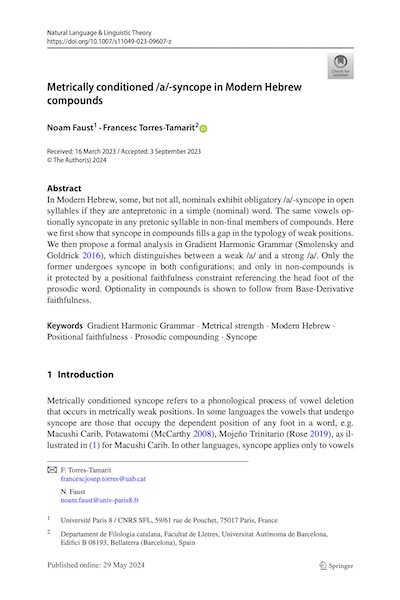
Autors:
Noam Faust & Francesc Torres-Tamarit
Títol:
Metrically conditioned /a/-syncope in Modern Hebrew compoundsEditorial: Natural Language & Linguistic Theory (Springer Link)
Data de publicació: 29 maig 2024
Text completIn Modern Hebrew, some, but not all, nominals exhibit obligatory /a/-syncope in open syllables if they are antepretonic in a simple (nominal) word. The same vowels optionally syncopate in any pretonic syllable in non-final members of compounds. Here we first show that syncope in compounds fills a gap in the typology of weak positions. We then propose a formal analysis in Gradient Harmonic Grammar (Smolensky and Goldrick 2016), which distinguishes between a weak /a/ and a strong /a/. Only the former undergoes syncope in both configurations; and only in non-compounds is it protected by a positional faithfulness constraint referencing the head foot of the prosodic word. Optionality in compounds is shown to follow from Base-Derivative faithfulness.
4 juny, 2024
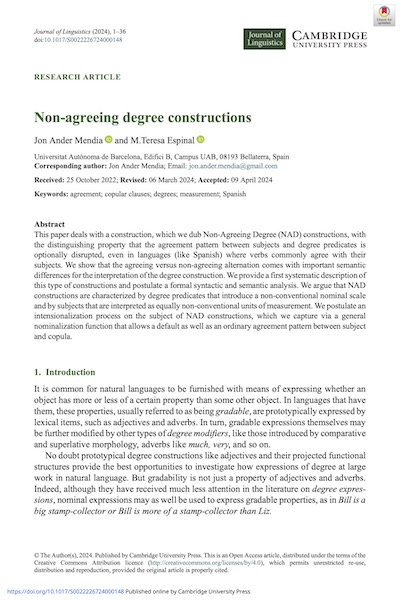
Autors:
Jon Ander Mendia & Maria Teresa Espinal
Títol:
Non-agreeing degree constructionsEditorial: Journal of Linguistics (Cambridge University Press)
Data de publicació: Online: 4 juny 2024
Pàgines: 36 Text completThis paper deals with a construction, which we dub Non-Agreeing Degree (NAD) constructions, with the distinguishing property that the agreement pattern between subjects and degree predicates is optionally disrupted, even in languages (like Spanish) where verbs commonly agree with their subjects. We show that the agreeing versus non-agreeing alternation comes with important semantic differences for the interpretation of the degree construction. We provide a first systematic description of this type of constructions and postulate a formal syntactic and semantic analysis. We argue that NAD constructions are characterized by degree predicates that introduce a non-conventional nominal scale and by subjects that are interpreted as equally non-conventional units of measurement. We postulate an intensionalization process on the subject of NAD constructions, which we capture via a general nominalization function that allows a default as well as an ordinary agreement pattern between subject and copula.
3 setembre, 2024
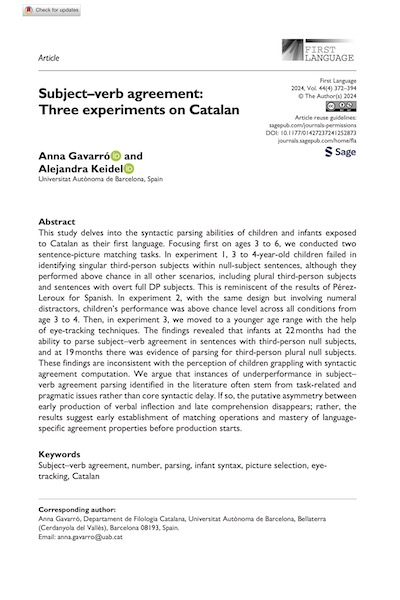
Autors:
Anna Gavarró & Alejandra Keidel
Títol:
Subject-verb agreement: Three experiments on CatalanEditorial: First Language (Sage Journals)
Data de publicació: Agost, 2024
Pàgines: 22 Text completThis study delves into the syntactic parsing abilities of children and infants exposed to Catalan as their first language. Focusing first on ages 3 to 6, we conducted two sentence-picture matching tasks. In experiment 1, 3 to 4-year-old children failed in identifying singular third-person subjects within null-subject sentences, although they performed above chance in all other scenarios, including plural third-person subjects and sentences with overt full DP subjects. This is reminiscent of the results of Pérez-Leroux for Spanish. In experiment 2, with the same design but involving numeral distractors, children’s performance was above chance level across all conditions from age 3 to 4. Then, in experiment 3, we moved to a younger age range with the help of eye-tracking techniques. The findings revealed that infants at 22 months had the ability to parse subject–verb agreement in sentences with third-person null subjects, and at 19 months there was evidence of parsing for third-person plural null subjects. These findings are inconsistent with the perception of children grappling with syntactic agreement computation. We argue that instances of underperformance in subject–verb agreement parsing identified in the literature often stem from task-related and pragmatic issues rather than core syntactic delay. If so, the putative asymmetry between early production of verbal inflection and late comprehension disappears; rather, the results suggest early establishment of matching operations and mastery of language-specific agreement properties before production starts.




